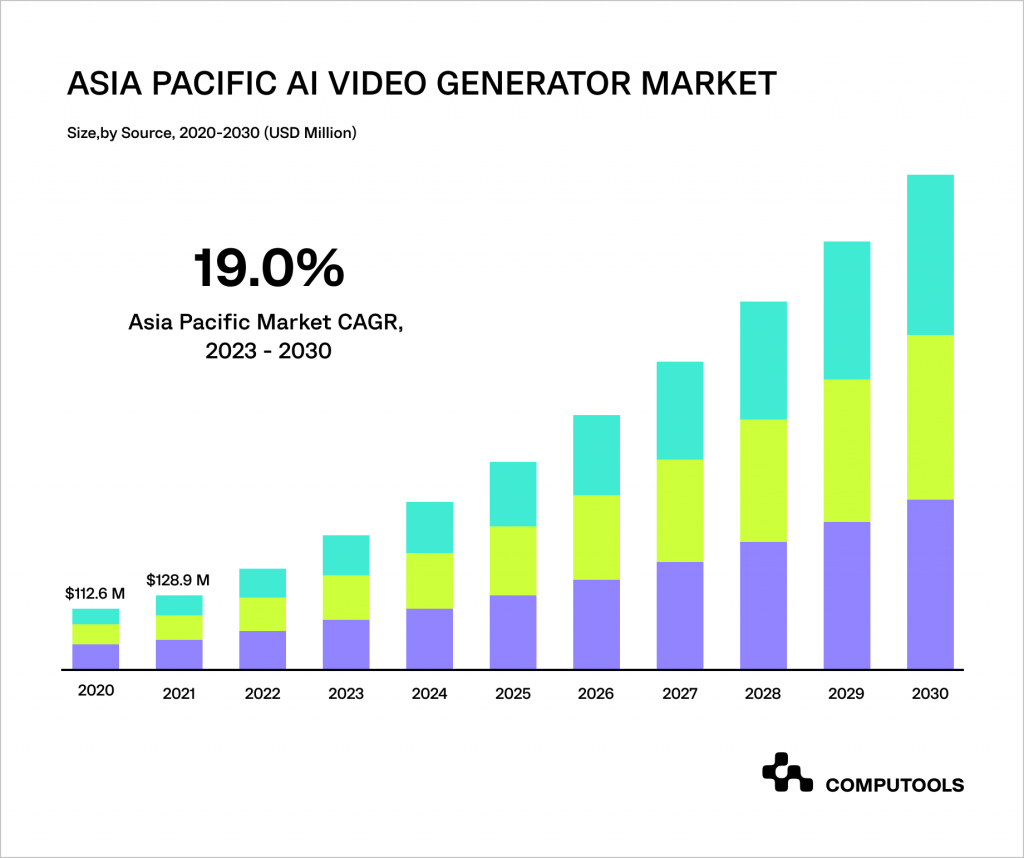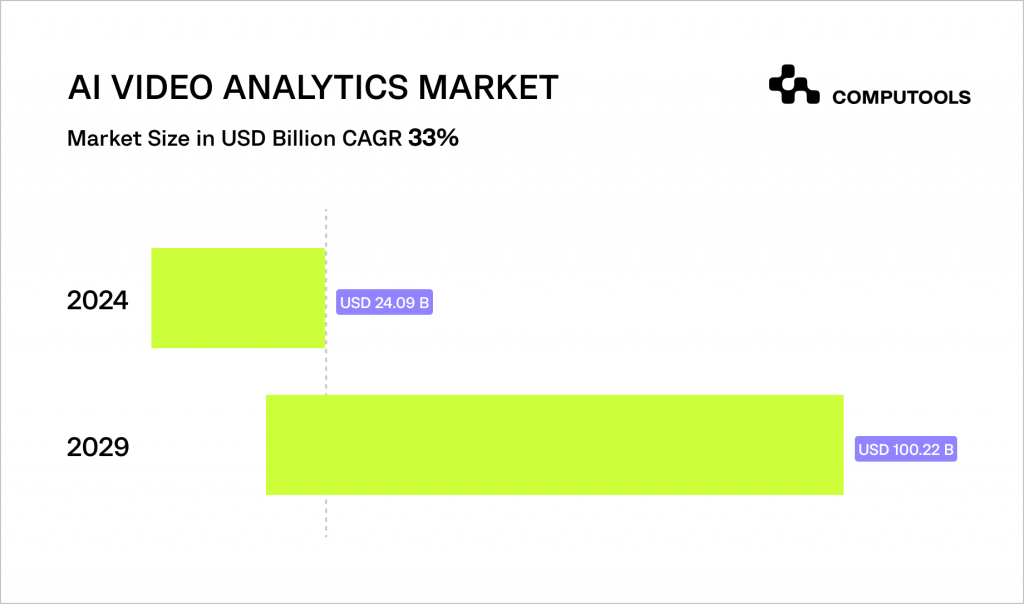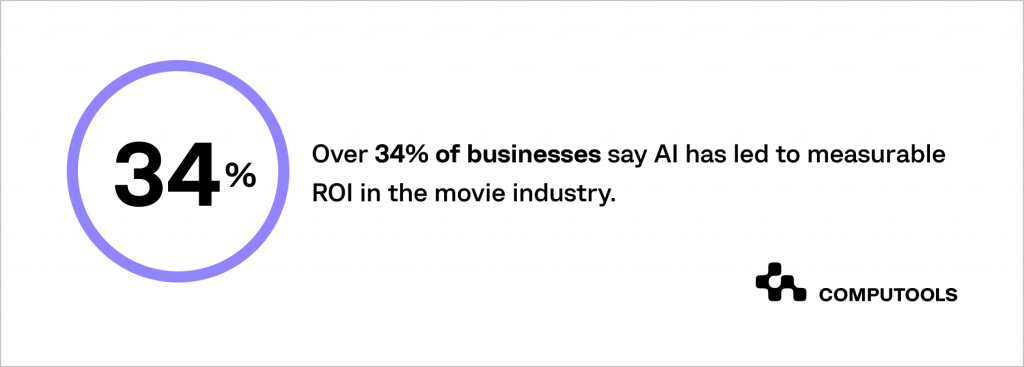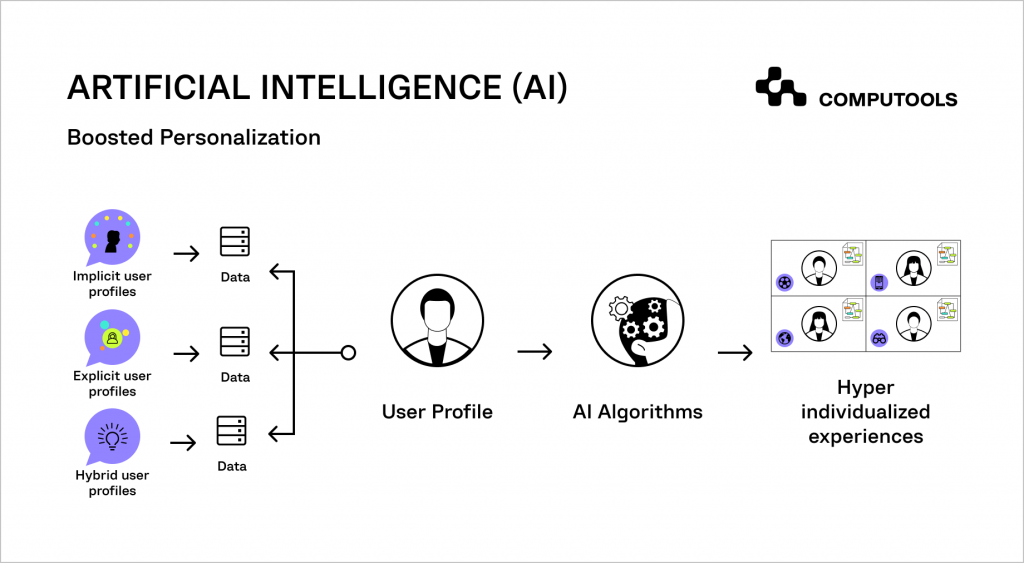Market Trends in the Video Industry
Technological advancements are changing the video industry significantly. Artificial intelligence (AI) and machine learning (ML) are at the heart of these changes. They are introducing new ways to create and edit videos, making these processes faster and more efficient.
According to Grand View Research, the global market for AI technology in the video industry, valued at approximately US$472.9 million, is anticipated to grow at a compound annual growth rate (CAGR) of 19.7% from 2023 to 2030. This significant growth is propelled by an escalating demand for video content, which can be attributed to the widespread adoption of visual media across various business sectors.
Video content is a major driver of online traffic, constituting about 80% of it. This trend underscores a shift in consumer preferences towards visual media over traditional text and images. Supporting this observation, a study by HubSpot found that 54% of consumers express a desire to see more video content from their preferred brands.
So, how important is AI for the video industry? Let’s see.
AI is hugely reshaping the media and entertainment sectors. Advanced algorithms tailor material for specific audiences, with Netflix and others using AI to recommend content and identify potential hits. AI also improves the consumer experience by enabling hands-free control through voice recognition and integrating personal assistants.
In marketing, AI ensures precise targeting of advertisements and aids in refining strategies through social media analysis. Marketers gain insights into viewer preferences, engagement patterns and content performance.
The education sector also benefits a lot from AI video-making tools. A report from Forrester reveals that educational videos contribute significantly to a 75% increase in information retention, making them invaluable for educators. As educational institutions increasingly recognise the potential of AI video creation, it is becoming the norm rather than the exception in the quest to improve learning outcomes.
AI is also a powerful asset in filmmaking. It uses advanced technology like performance capture and facial recognition to handle complex tasks, such as tracking actors, and excels in analysing video footage to quickly identify elements like locations, objects, actors and activities within a scene.
As evident, the video industry is increasingly adopting AI solutions across various sectors, swiftly adapting to and benefitting from its numerous advantages.
This article explores the impact of AI on the video creation industry as a whole. We will explore the advantages and challenges that AI brings to these fields. The article also offers a look into what future trends might emerge from the newest AI technology.

The Impact of AI on the Video Industry
1. Enhanced Analytics
When AI capabilities join forces with analytics tools, businesses gain a clearer understanding of their audience, refining video marketing strategies for maximum impact.
According to Mordor Intelligence, the AI video analytics market is projected to be valued at approximately $US24.09 billion in 2024 and is anticipated to surge to around $US100.22 billion by 2029.
AI becomes a valuable tool in tracking viewer engagement and analysing behaviours like watch duration and content skipping patterns. This insightful data allows businesses to segment and target audiences based on demographics, interests and preferences, tailoring content to specific viewer groups.
Additionally, AI-driven analytics tools not only pinpoint areas for content improvement but also provide practical suggestions for changes to titles, keywords and descriptions based on click-through and conversion rates.
Going beyond, these instruments predict potential outcomes of diverse video marketing strategies, empowering businesses to make informed decisions and enhance the overall effectiveness of their video marketing efforts.

2. Automated Video Distribution
The sheer volume of online video content poses challenges in effectively categorising and ensuring ease of searchability. Fortunately, AI software solutions are at the forefront of addressing this issue.
AI film digitalisation platforms not only expedite the classification of objects in movies but also automate the process of content categorisation. The result is a significant acceleration in the workflow, accompanied by substantial savings in human work hours.
3. AI Voiceover and Dubbing
AI has taken on new roles in the video industry, extending its capabilities to include dubbing and voiceovers. These solutions allow businesses to reach broader audiences by speaking to them in different languages.
YouTube’s Aloud service is an example of AI-driven dubbing technology, automatically dubbing videos, translating content into multiple languages using robotic voices and providing transcriptions.
In addition to dubbing, AI-driven solutions use machine learning algorithms and natural language processing for video creation. AI-generated voiceovers offer speed, customisation and consistency, and can be created within minutes as opposed to the long process of human voice recordings.
Furthermore, creators and businesses can tailor voices, accents, volume and speed using AI technology to align with specific video content styles and tones.
4. Automated Scriptwriting
AI has become a valuable partner in the world of scriptwriting, with tools like ChatGPT and Bard analysing vast amounts of data to help filmmakers create engaging storylines, plot twists and dialogue.
By training models on key elements of various films, AI can suggest plot points and reactions, enhancing the overall storytelling. AI scripts stand out for their adaptability to real-time events, allowing filmmakers to draw inspiration from the latest news or cultural phenomena.
Moreover, filmmakers can customise elements of the plot for specific audience segments. The impact of AI results is an innovative and dynamic narrative that captivates audiences, keeping them hooked from beginning to end.
5. Video Editing
AI technology, particularly AI for production teams, is transforming the realm of video editing by assisting in specialised tasks like colour correction, background removal and sound editing. These AI tools extend their capabilities beyond mere basic editing.
Many AI programs are adept at automatically creating jump cuts, removing silences, accelerating scenes and refining the editing in videos and podcasts. Impressively, they can also pinpoint the best version of a clip and filter out unwanted takes.
Incorporating AI software into video editing does more than streamline the editing process; it significantly boosts efficiency in content production, which is crucial for tackling the diverse video editing challenges.
6. Effective Marketing Strategies
Marketers have consistently found video production to be the most effective way to reach their audience, offering great returns on investment. In fact, HubSpot’s research shows that 90% of marketing specialists who use short videos plan to keep or increase their spending.
Thanks to AI, advertisements can now adapt to individual viewers’ interests, and by extracting data from social media and online platforms, AI enables targeted content, improving the overall viewing experience.
In the future, ads are expected to seamlessly integrate into personalised movies and videos based on individual preferences.
Video production businesses can use more AI tools to create visually appealing content, enhancing brand storytelling and audience engagement.
7. Automation of Repetitive Tasks
AI and ML technologies are revolutionising the video industry, introducing advanced automation to simplify the creative flow and streamline working processes. These technologies automate tasks such as video editing, object and actor recognition and post-production, going as far as generating creative content.
Videomakers benefit significantly from integrating AI video processing, gaining access to tools that make their work more efficient, saving time and enhancing creativity. By automating boring and time-consuming labour, they can concentrate on shaping their creative vision.
Learn more about AI development services in video production.
Contact us →Businesses Embracing AI Development Services
The rise of AI technology is significantly changing how businesses of all sizes approach video creation. According to a report by Zipdo, over a third of businesses have seen a real return on investment from using AI in the film industry. This is just a small example of what AI software solutions can suggest in this field.
1. AI for Large Companies
AI helps large companies save money by reducing the need for big production teams, which cuts down on labour costs. AI-generated videos also ensure that the company’s branding is consistent across all its videos, which is important for maintaining its image and reputation.
Imagine a multinational corporation using AI for their global marketing campaigns. Instead of hiring large production teams in every country, it opts for AI development services. AI can automatically adjust the language, cultural elements and branding in their promotional videos for different regional markets, all while maintaining a consistent brand identity.
2. AI for Small and Medium-Sized Businesses
Smaller businesses, which often have limited budgets, benefit greatly from AI-driven video tools. These tools are affordable and easy to use, allowing SMEs to make quality videos without spending too much.
For example, a small local bakery wants to expand its online presence. It doesn’t have a big budget for marketing, but AI video tools might offer pre-made templates where the bakery can easily insert images of their products, add text and even select music, creating engaging content for social media without the high costs.
3. AI for Start-ups
Start-ups can use AI to come up with unique and engaging video ideas, even with limited resources. AI tools also make it possible to produce more content quickly, which is great for trying out different strategies and making changes based on what works.
Let’s say a tech start-up is looking to showcase its innovative app. AI tools could help the team to experiment with different visual styles and formats to see what best captures the essence of their app and resonates with their target audience. The ability to quickly produce and modify AI marketing videos would enable the start-up to efficiently test various marketing strategies and adapt based on user feedback.
Overall, AI tools offer tailored solutions that meet the specific needs and constraints of different types of businesses, from cost-saving measures for large corporations to creative and budget-friendly options for everyone.

Future Predictions and Possibilities
The integration of AI into video content development is leading to a significant transformation. It’s not just about streamlining editing and routine tasks, the potential of AI extends much further.
1. Effective Storytelling
Looking to the future, AI’s predictive analytics are set to deeply understand and influence audience engagement, changing the way storytelling works. By examining viewer behaviour, the algorithms can pinpoint story elements that resonate most, leading to content that is both more captivating and tailored to the audience.
2. Interactive Video Experiences
AI video production is advancing towards more interactive and immersive experiences. AI allows viewers to interact with content in real time, transforming them from spectators to active participants.
3. Personalised Content
A particularly intriguing aspect of AI in video is its capacity to dynamically adjust content based on viewer reactions. Imagine a TV show or movie that evolves its plot or characters in response to how an individual viewer reacts. This development is close to becoming a reality, promising a more engaging viewing experience.

4. Ethical Considerations
Nevertheless, as AI becomes more ingrained in film production, ethical considerations are becoming more important. It’s necessary for creators and platforms to be transparent about their use of AI and to adhere to ethical standards. Balancing the personalisation capabilities of AI with privacy concerns will be a crucial and ongoing challenge in the coming years.
Final Words
We’re just beginning to explore a space where artificial intelligence is transforming the landscape of film and video production. AI is taking care of mundane tasks, such as organising data and handling preliminary edits, freeing up creators to focus on the artistic aspects of their work.
Moreover, advanced algorithms are enhancing editing and analytic capabilities, making production faster and marketing more efficient.
But what’s truly exciting is how AI and human creativity are collaborating. Filmmakers can now use AI tools for scriptwriting, predicting trends and even crafting visual effects, adopting a more innovative and collaborative approach to storytelling and video making in general.
Today, video production business leaders can simplify their processes and unleash creative potential. AI technologies offer fresh opportunities while maintaining the distinct human touch that turns each video into a captivating masterpiece.
Explore emerging trends and the advantages of integrating AI technology. For a detailed exploration, contact us through email at info@computools.com.









Computools was selected through an RFP process. They were shortlisted and selected from between 5 other suppliers. Computools has worked thoroughly and timely to solve all security issues and launch as agreed. Their expertise is impressive.